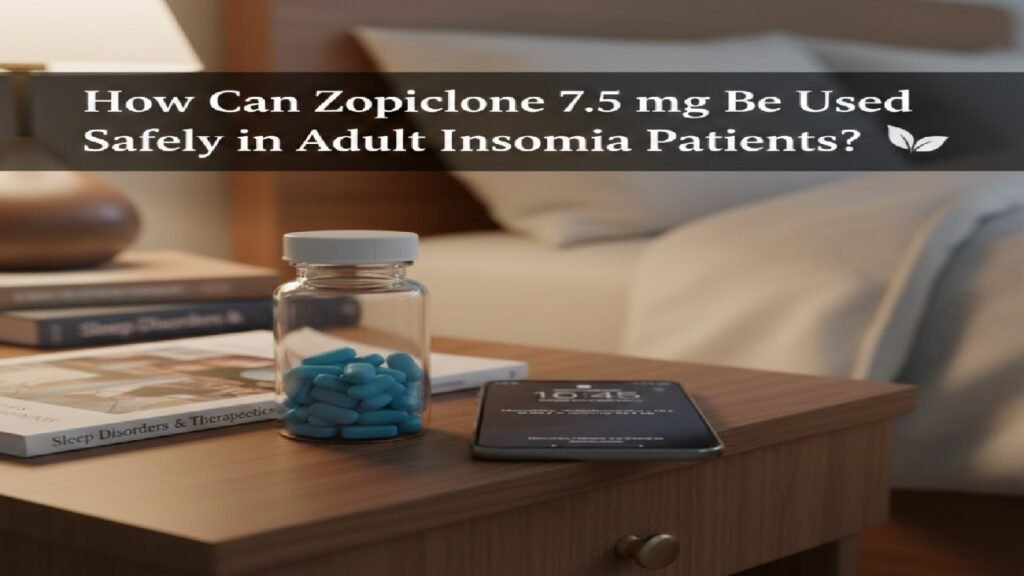Sleep is one of the pillars of good health, yet many people around the globe struggle to get enough quality rest. Insomnia—difficulty falling asleep, staying asleep, or waking up too early—is a common issue that impacts millions. When lifestyle changes and natural remedies aren’t enough, many turn to sleep aids for relief.
One popular prescription option is zopiclone, but it’s far from the only choice available. With numerous sleep medications on the market—and even some natural supplements—how do you know which one is right for you?
This comprehensive guide compares zopiclone online UK to other common sleep aids, exploring how they work, their benefits, drawbacks, and safety considerations. The goal is to help you understand your options better and make an informed conversation with your healthcare provider.
What Is Zopiclone?
Zopiclone belongs to a group called “Z-drugs,” used primarily for short-term treatment of insomnia. It is not a benzodiazepine but works similarly by enhancing the effect of the neurotransmitter GABA (gamma-aminobutyric acid), which has calming effects on the brain.
Zopiclone helps to reduce the time it takes to fall asleep and increases the duration of sleep. It usually has a half-life of about 5 hours, making it suitable for people who have trouble maintaining sleep throughout the night.
Doctors often prescribe zopiclone for no longer than 2 to 4 weeks because of risks like tolerance (needing more drug for the same effect) and dependence.
Common side effects:
- Bitter or metallic taste
- Dry mouth
- Drowsiness the next day
- Headache or dizziness
Also Read: How Long Will I Sleep If I Take Zopiclone?
Comparing Zopiclone to Other Sleep Aids
There’s a wide variety of sleep aids available. Let’s look at how zopiclone stacks up against several common types.
1. Benzodiazepines (e.g., Temazepam, Diazepam)
How they work:
Benzodiazepines also enhance GABA activity but tend to have a broader sedative effect. They are traditionally prescribed for anxiety, seizures, and insomnia.
Pros:
- Effective for severe insomnia and anxiety
- Longer history of medical use
Cons:
- Higher risk of dependency and withdrawal symptoms than zopiclone
- More impact on memory and coordination
- Longer half-life means more “hangover” effect the next day
Who they’re for:
Typically only for short-term use in acute anxiety-related insomnia or severe sleep problems.
2. Zolpidem (Ambien)
How it works:
Like zopiclone, zolpidem is a non-benzodiazepine that specifically targets the GABA-A receptor subtype associated with sleep induction.
Pros:
- Short half-life (2-3 hours), so less next-day drowsiness
- Effective in helping people fall asleep quickly
Cons:
- Short duration may not help with waking during the night
- Can cause memory problems or sleep behaviors (walking, eating while asleep)
Who it’s for:
People who have difficulty falling asleep but generally do not wake frequently during the night.
3. Melatonin and Melatonin Receptor Agonists (Ramelteon)
How they work:
Melatonin is a natural hormone that regulates the sleep-wake cycle. Supplements or receptor agonists help reset the body’s internal clock.
Pros:
- Generally well-tolerated with minimal side effects
- Suitable for circadian rhythm disorders and mild insomnia
Cons:
- Less potent for chronic or severe insomnia
- Effects may take several days to appear
Who they’re for:
People with jet lag, shift work sleep disorder, or mild difficulty falling asleep.
4. Antihistamines (Diphenhydramine, Doxylamine)
How they work:
These block histamine receptors in the brain, which can cause drowsiness.
Pros:
- Available over-the-counter (OTC)
- Inexpensive
Cons:
- Can cause dry mouth, constipation, urinary retention
- Not recommended for long-term use or older adults due to confusion and falls risk
- Tolerance develops quickly
Who they’re for:
Occasional use when prescription meds are not desired or available.
5. Herbal and Natural Supplements (Valerian, Chamomile, CBD)
How they work:
Vary widely; often act on GABA or have calming effects through other brain pathways.
Pros:
- Perceived as “natural” and gentle
- Few serious side effects reported
Cons:
- Limited scientific evidence of effectiveness
- Quality and potency vary between products
Who they’re for:
People looking for mild sleep support without pharmaceuticals.
Effectiveness and Safety: Zopiclone vs Others
Effectiveness
- Studies show zopiclone and eszopiclone offer comparable and reliable relief for insomnia symptoms, particularly improving total sleep time and sleep efficiency compared to placebo.
- Zolpidem is similarly effective but may be better for sleep onset specifically.
- Benzodiazepines are potent but carry more risks when used long-term.
Safety
- Zopiclone’s side effects include bitter taste, drowsiness, and mild dizziness but is relatively well-tolerated in recommended doses.
- Benzodiazepines can cause more pronounced cognitive and motor impairment and have a stronger withdrawal effect.
- Sedating antihistamines and OTC options can cause next-day grogginess and are less suited for chronic insomnia.
- Natural supplements generally have fewer side effects but also less proven efficacy.
Dependence and Withdrawal Concerns
One major difference between zopiclone and many other sleep aids, especially benzodiazepines, is the risk of dependence.
- Zopiclone can lead to dependence if used longer than recommended, with withdrawal causing irritability, insomnia, and anxiety.
- Benzodiazepines typically have a higher dependence potential and often require tapered discontinuation.
- OTC antihistamines and natural supplements generally have a lower dependence risk but may lose effectiveness over time.
Which Is Right for You?
Choosing the right sleep aid depends on many factors, including:
- Type and severity of insomnia: Difficulty falling asleep vs staying asleep
- Duration of sleep issue: Short term vs chronic insomnia
- Medical history: Other medications, addiction history, underlying conditions
- Side effect tolerance: Sensitivity to drowsiness, memory issues
- Lifestyle: Work schedule, age, driving or operating machinery needs
General Recommendations
- Try lifestyle and behavioral changes first (sleep hygiene, CBT-I).
- Use prescription sleep aids like zopiclone or zolpidem only for short-term relief under medical supervision.
- Avoid mixing CNS depressants (alcohol, opioids) with any sedative sleep meds.
- Melatonin or natural supplements may help mild insomnia or circadian rhythm issues.
- Consult your doctor before starting or stopping any sleep medication to discuss risks and benefits.
Final Thoughts
Zopiclone is a reliable and commonly prescribed option for short-term insomnia, especially when sleep maintenance is a problem. However, other sleep aids, both prescription and over-the-counter, offer different benefits and risks that may better suit individual needs.
Ultimately, the best approach to sleep treatment is personalized, balancing effectiveness with safety. A healthcare provider’s guidance, along with careful monitoring, ensures that sleep aids help improve rest without jeopardizing overall health and wellbeing.
Also Read: Zopiclone Maximum Dose in 24 Hours: A Complete Guide





2 Responses